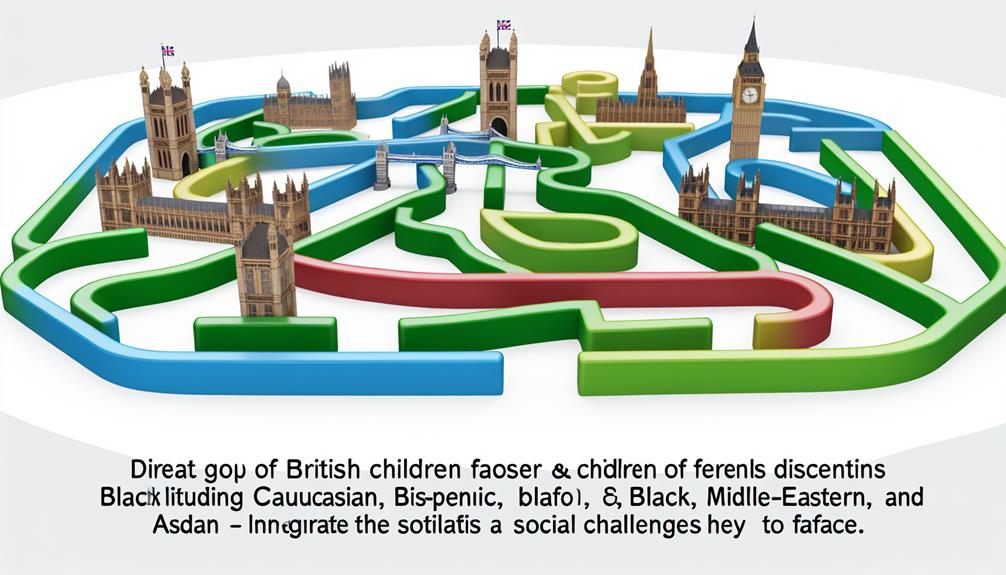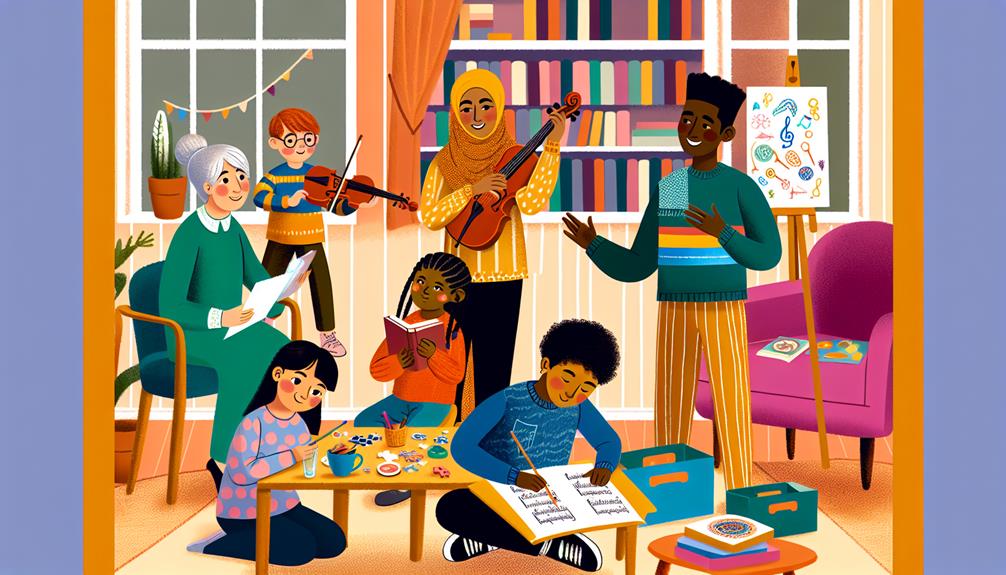Foster children in the UK navigate a unique journey. Their lives often involve adapting to new homes, dealing with emotional trauma and wrestling with low self-esteem. Due to frequent moves, they pan out social challenges like isolation, and identity issues. Their educational journey isn't smooth either with changing schools and academic struggles. There's a dire need for reforms, more robust caregiver training, and increased funding for their inherent potential to shine through. Their extraordinary resilience and adaptability amid these insights reveal their spirit. Take another step to uncover a deeper understanding of these young lives, it's an insightful experience.
Key Takeaways
- British foster children often grapple with emotional upheaval, attachment issues, and a constant sense of loss.
- They face significant social challenges, including stigma, identity struggles, and difficulties in forming stable friendships.
- Frequent changes in their living arrangements lead to disruptions in their education, causing academic difficulties and limited extracurricular opportunities.
- Foster children show resilience and adaptability despite the challenges, often forming connections in new environments.
- Improvements in the foster care system, such as legislative reforms and better resources, are crucial for enhancing their experiences and outcomes.
Understanding the UK Foster Care System

To truly comprehend the experiences of British foster children, you first need to understand the intricacies of the UK foster care system. This system is governed by a complex legislative framework, designed to safeguard the welfare of these vulnerable children. You see, it's not just about providing a roof over their heads; it's about ensuring their holistic development in a secure, nurturing environment.
Foster parent training plays a significant role in this system. It's not about who wants to be a foster parent, but rather, who's most suited to this important role. The training is detailed, covering everything from understanding the emotional needs of children, to managing potential behavioural issues. They're also taught to navigate the often complex dynamics of birth family contact.
The foster care system in the UK is by no means perfect, but it's a system that prioritizes the child's needs first. The better you understand this, the more insight you'll gain into the experiences of British foster children. So, let's explore further, uncovering the realities hidden within the UK foster care system.
Emotional Impact on British Foster Children
Having grasped the structure of the UK foster care system, let's now consider the emotional impact it has on the children involved, as it's their hearts and minds that bear the brunt of this intricate process.
Imagine these scenarios, which provide a snapshot of the emotional challenges faced by these children:
- Feeling uprooted and unsettled as they're moved from one home to another, struggling with a sense of belonging.
- Battling attachment issues, hesitant to form bonds with foster parents for fear of yet another heartbreak.
- Dealing with the aftermath of trauma, employing various coping mechanisms, some of which may be harmful in the long run.
- Feeling a constant sense of loss, not just for their biological parents, but also for their previous foster homes and the relationships they formed there.
- Grappling with feelings of rejection and abandonment, which can often lead to low self-esteem and a negative self-image.
Understanding these emotional realities is critical. It's not just about providing a safe home, but also about nurturing their emotional well-being. As you can see, trauma coping and handling attachment issues are pivotal aspects of their emotional journey.
Let's keep these insights in mind as we further explore the life of British foster children.
Social Challenges of UK Foster Kids

Stepping into the social sphere, UK foster kids often find themselves tackling a unique set of challenges that extend beyond their personal emotional battles. One such challenge is the stigma perception associated with being in foster care. This perceived stigma can lead to feelings of isolation and affects their ability to form relationships. You'll often find them wrestling with questions about their identity and struggling with self-esteem.
Furthermore, these kids face friendship struggles. The constant movement between homes and schools doesn't just disrupt their education but also strains their social connections. They're frequently forced to adapt to new environments and create new relationships, which can be incredibly taxing.
But don't mistake these challenges as insurmountable. Many foster kids demonstrate extraordinary resilience and adaptability. They're capable of forming strong connections, despite the hurdles. Understanding these challenges allows you to empathize with their experiences and, hopefully, contribute to creating a more inclusive and supportive environment for them.
The social challenges UK foster kids face are significant, but with awareness, understanding, and action, they can be addressed.
Education Experiences of Foster Children
Exploring the educational terrain can be a challenging task for foster children, as they're often faced with frequent school changes and academic setbacks. As you navigate their journey, understanding their educational experiences is essential.
Their experiences often include:
- Struggling with continuous changes in their school environment, resulting in an unstable foundation for learning.
- Facing academic struggles due to emotional distress and lack of consistent academic support.
- Experiencing difficulties in forming lasting relationships with peers and teachers due to frequent relocations.
- Having limited opportunities for extracurricular participation because of changing schools and homes.
- Receiving inconsistent academic support due to gaps in communication between schools and foster families.
You'd think their academic journey is a turbulent one, filled with obstacles and disruptions. However, despite these challenges, foster children often demonstrate resilience and adaptability, with many showing remarkable progress when given consistent academic support and opportunities for extracurricular participation.
Understanding their educational experiences allows you to appreciate their struggles and triumphs, and it equips you with the insights needed to further support foster children in their educational journey. This understanding is a valuable tool in enhancing their future and shaping the narrative of foster care in Britain.
Ways to Improve British Foster Care

Given these challenges, it's crucial to explore effective strategies that can enhance the British foster care system and create a more stable and supportive environment for these resilient children. Foster care legislation and adoption processes, for instance, could be reformed to better accommodate the needs of these children.
| Strategies | Implementation | Expected Outcome |
|---|---|---|
| Reforming Foster Care Legislation | Streamline processes, make sure child's voice is heard | Increased stability for children |
| Improving Adoption Processes | More thorough vetting, enhanced matching | Less disruptions, better familial matches |
| Enhanced Training for Foster Parents | Regular training, emotional support | Improved child care, lower placement disruptions |
| Increased Funding | More resources for children, foster parents | Improved quality of life, better resources |
You see, changing legislation could provide more stability by making sure that placements are more carefully considered and that children's voices are included in decisions about their care. Improving the adoption process could reduce placement disruptions and ensure that children are matched with families that are best suited to their needs. Enhanced training for foster parents can equip them with the skills and knowledge they need to better support foster children. To end, increased funding can provide the resources necessary for these improvements. It's about creating a system that truly puts the needs of the child first.
Frequently Asked Questions
What Are Some Notable Success Stories of British Foster Children?
You'll find numerous cases of British foster children exhibiting fostered resilience and achieving dreams. Many have become successful professionals, inspiring authors, or influential activists, turning their challenging beginnings into powerful narratives of triumph and determination.
How Do the Experiences of British Foster Children Compare to Those in Other Countries?
You'd find that British foster children, like others globally, face cultural adaptations and emotional challenges. However, their experiences often vary due to differing child protection laws and societal attitudes towards foster care.
What Types of Support Systems Are Available for British Foster Parents?
You'll find various support systems in place for British foster parents, including funding opportunities and guidance on adoption procedures. These resources help mitigate challenges, ensuring you provide the best care for your foster child.
How Has the British Foster Care System Evolved Over the Years?
You've seen the British foster care system grow, with notable Foster System Reforms and Caregiver Training Improvements, showing evolution in policy, practice, and perception, all aimed at improving the lives of these valuable children.
Are There Any Famous Individuals Who Have Come From the British Foster Care System?
Yes, there are. Overcoming foster care stigma, celebrities like Lemn Sissay and Marilyn Monroe used their experiences to fuel their success and advocate for foster children, showing the world their strength and resilience.
Conclusion
Traversing the UK foster care system isn't easy – for both the children and their carers. Shockingly, statistics reveal that nearly 40% of British foster kids experience significant emotional issues. Social challenges and educational gaps are prevalent too.
But remember, understanding these insights is the first step towards building a better system. It's about time we collectively commit to improving the lives of these children – they truly deserve it.




